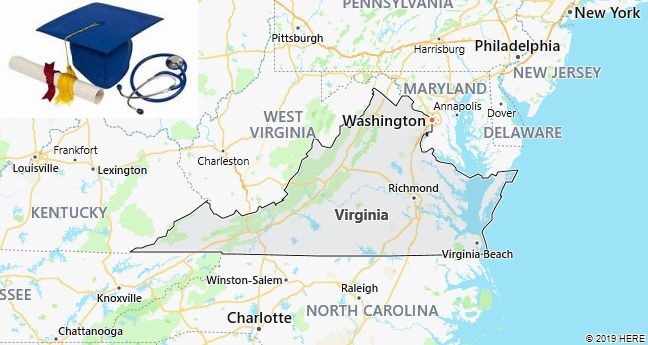If you intend to purse a nursing degree in Virginia, you should aim at the top nursing schools in Virginia. Let’s show below, which schools have a standard curriculum for nursing education and are recognized by the market.
See the latest nursing school ranking of the state and check the top nursing colleges among the institutions and the best evaluated courses in Virginia.
List of Best Nursing Colleges in Virginia
| Rankings | Nursing Universities | Nursing Colleges |
| 1 | University of Virginia Mailing Address: PO Box 800782, Charlottesville, VA 22908-0782 Phone Number: (434) 924-0141 E-mail: nur-osa@virginia.edu Website Homepage: http://www.nursing.virginia.edu/ |
School of Nursing |
| 2 | Virginia Commonwealth University Mailing Address: 730 East Broad Street, Richmond, VA 23298 Phone Number: (804) 828-0724 E-mail: vcu_nurse@mail2.vcu.edu Website Homepage: http://www.nursing.vcu.edu |
School of Nursing |
| 3 | George Mason University Mailing Address: PhD in Nursing Office, MSN 3C4, Fairfax, VA 22030-4444 Phone Number: (703)993-1961 E-mail: kgaffney@gmu.edu Website Homepage: http://chhs.gmu.edu/nursing/index |
School of Nursing |
| 4 | Old Dominion University Mailing Address: Office of Admissions, Norfolk, VA 23529-0500 Phone Number: (757) 683-3685 E-mail: gradadmit@odu.edu Website Homepage: http://hs.odu.edu/nursing/ |
School of Nursing |
| 5 | Radford University Mailing Address: PO Box 6964, Radford Station, Radford, VA 24142 Website Homepage: http://nurs-web.asp.radford.edu/ |
Waldron College of Health Human Services School of Nursing |
| 6 | Hampton University Mailing Address: 100 E. Queen Street, Hampton, VA 23668 Phone Number: (757) 727-5672 Website Homepage: http://nursing.hamptonu.edu/ |
School of Nursing |
| 7 | James Madison University Mailing Address: MSC 4305, Harrisonburg, VA 22807 Phone Number: (540) 568-1700 E-mail: halepj@jmu.edu Website Homepage: http://www.nursing.jmu.edu/msn/index.html |
Department of Nursing |
| 8 | Marymount University Mailing Address: 2807 N. Glebe Road, Arlington, VA 22207-4299 Phone Number: (703) 522-5600 Website Homepage: http://www.marymount.edu/academics/programs/nursingBSN |
School of Health Professions Department of Nursing |
| 9 | Shenandoah University Mailing Address: 1775 North Sector Court, Winchester, VA 22601 Phone Number: (540) 678-4374 Website Homepage: http://www.su.edu/health/0B875B3A348444769D87E900A02AF363.asp |
Division of Nursing |
| 10 | Liberty University Mailing Address: 1971 University Boulevard, Lynchburg, VA 24502 Phone Number: (434) 582-2000 E-mail: gradadmissions@liberty.edu Website Homepage: http://www.aboutnursing.com/schools/virginia/liberty-university.htm |
Master of Science in Nursing Program |

History of the State of Virginia – Age of Revolution
In the first half of the 18th century, Virginia grew and developed without much upheaval, but already in the fifties and sixties, anti-British sentiments spread widely among the residents of the colony.
The main reason for discontent was the taxes imposed by the British Parliament on American colonists. Virginia’s highest legislature, the General Assembly, took the position of “no taxation without representation.” This meant disagreement with the current situation, in which the residents of the colony were taxed, without providing seats in the British Parliament at the same time.
On May 29, 1765, one of the deputies of the General Assembly, Patrick Henry, delivered a speech that went down in the history of the American Revolution. Protesting against the infringement of the rights of the colonists, he said: “Caesar had his Brutus, Charles I had Cromwell, George III may have a similar fate!” In fact, it was an undisguised threat and a call to disobedience to the British king.
Although not all deputies supported Patrick Henry’s call, several resolutions were nevertheless passed by legislators, now known collectively as “Virginia Decides” (according to the first words of their text). They expressed the growing public anger directed against the British crown, and served as one of the prerequisites for the coming American revolution. Virginia Governor Francis Fauquier responded to the “Virginia Decrees” resolutions by dissolving the General Assembly.
The next few years, the confrontation between Britain and its American colonies escalated. In 1769, the metropolitan government attempted to bring rioters from Boston, Massachusetts, to England for trial, which caused a wave of resentment in the colonies.
The Virginia Parliament met to consider a resolution condemning London’s actions, but was again dissolved by the governor. The MPs held a meeting in one of the taverns of Williamsburg (known as “Raleigh’s Tavern”) and in protest decided to ban the import of British goods.
In 1773, after another attempt by the British authorities to try Americans in England, several opposition leaders formed a committee in Virginia to coordinate actions against Britain. The new committee included such prominent personalities as Patrick Henry, Thomas Jefferson, Richard Lee, George Mason and others. Similar committees were also set up in Delaware, Connecticut, Massachusetts, New Hampshire, Pennsylvania, Rhode Island, North Carolina, and South Carolina, but the Virginia committee was the only one appointed by the colonial legislature and held official status.
In 1774, after the Virginia General Assembly expressed solidarity with the rebellious (Boston Massacre of 1770, Boston Tea Party of 1773) Massachusetts, the governor of the colony, Lord Dunmore, again dissolved Parliament. The colonists establish a revolutionary provisional government, the Convention of Virginia, which existed until the creation of the independent Commonwealth of Virginia in 1776. At its first meeting, held in August 1774, the Convention expressed solidarity with Massachusetts and approved a boycott of English goods. In addition, delegates were elected to the Continental Congress, a meeting of twelve representatives (Georgia did not send its delegates) of the colonies, held in September-October 1774 in Philadelphia, Pennsylvania. It was one of the representatives of Virginia, Peyton Randolph, who was elected chairman of the First Continental Congress.

